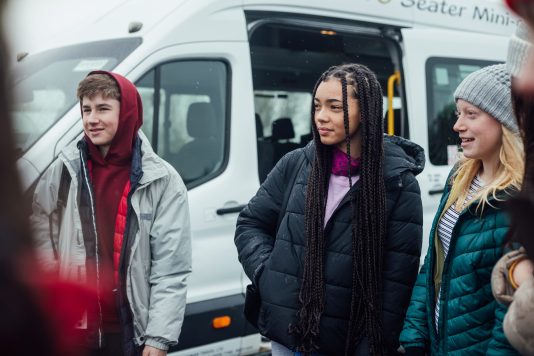


“It’s such a shame that not all teenagers have the opportunity to live elsewhere than with their family.”
– Françoise Dolto, « La cause des adolescents »
Gaining autonomy is a key part of adolescence, ensuring that teens’ self-identity develops and flourishes. For teens from disadvantaged backgrounds, who often face complex challenges, this autonomy can be vital. These teens often face difficulties accessing education, limited resources and fewer employment opportunities. Becoming physically, psychologically, economically and socially autonomous is therefore an essential means of fulfilling their potential independently of their social environment. In bringing young people together for a travel project, we offer them a unique opportunity to develop their autonomy so they can discover their self-identity and take off, beyond their home environment.
Travelling: an opportunity for young people in vulnerable situations to get to know themselves
Teenagers have a fundamental need to differentiate themselves from adults to build their own personalities. Through travel, teens are able to see different realities than their own, allowing them to better understand themselves and to take stock of their own strengths and weaknesses. Away from their family’s supervision, they have the opportunity to decide for themselves what they want to do, take risks and face the consequences of their actions, and, gradually, make better-informed decisions.
Travelling can also elicit strong emotions in teenagers, ranging from excitement to anxiety and nostalgia. By facing all these emotions all while being far from home, these teens are able to develop emotional autonomy and become more confident in their ability to manage their behaviour in response to life’s challenges. These skills are made more important by the fact that one in three children from disadvantaged backgrounds are at risk when starting school in at least one sphere of their development (social skills, communication skills, emotional maturity, etc.).

Additionally, having some distance from their parents gives teens from precarious backgrounds the space to affirm their own emotions and ideas, separate from the ones they are raised with.
Travel also presents teens with the opportunity to be a part of a group of peers, with whom they can become friends, another thing that can help them gain autonomy. Being part of a group of peers contributes to a sense of belonging, which allows teens to separate themselves from the world of adults. Because of this, teenagers feel like they need their elders less, as they can rely more on their friends to support them and help them find solutions to the challenges they are facing.
Their peers can also help them define their identity by giving them the possibility of comparing themselves to others in terms of their similarities and their differences. Teens not only need to fit in with their friends to define their identity, but also need to be different in their own ways, with unique qualities, personal and interpersonal challenges.
In order to exist as a group, teens must collaborate to actively participate in and work toward their travel project, which helps them decenter themselves and be more open to others.
The trip in a youth hostel is especially conducive to this “collective” discovery of autonomy. By experiencing a travel project with their friends, teens from disadvantaged backgrounds can be a part of a group other than their family, without having to reject them.
Travelling: a way for teens from disadvantaged backgrounds to take back control of their lives
“Being autonomous means deciding what you do and how you do it based on the direction you want your life to take.”
– Michel Fize, Antimanuel de l’adolescence
By planning a travel project, teens with precarious backgrounds progressively gain autonomy. Because they face more complex challenges than their more affluent peers, they become more capable of understanding their deepest aspirations, of making informed decisions and of making better choices in the long term.
“To handle it all, you must have the resources within yourself very early on and be able to call on helping hands and teachers of resilience.”
– Boris Curylnik
According to Boris Curylnik’s theory, a teacher of resilience is “a person, place, event, object or work of art that triggers a process of psychological development after a trauma.” Travelling, a positive event which encourages encounters, can provide an incredible opportunity to meet teachers of resilience.
These teachers can then show them other possibilities, along with the determination necessary to overcome life’s obstacles. Knowing how to recover from failure is an essential skill for success in an ever-evolving world.

Organizing a trip with their classmates allows teenagers to develop communication, problem solving and project management skills. Thanks to these new skills, they gain confidence in themselves and in their ability to take advantage of the opportunities presented to them. Therefore, by participating in a positive project in a school environment, teens develop a different relationship with school, increasing their investment in school and their professional success.
Gradually, they can become more independent from their home environment, while still maintaining their emotional relationship with it. In fact, teenagers need that continued connection with their parents to feel safe and motivated to discover different realities. For teens with diverse backgrounds, it’s an essential aspect of navigating between their culture of origin and their host culture.
Author Kim Thùy said, on the topic of the Vietnamese community: “In the beginning, it’s a support, a resource, this is how it is for many immigrants and refugees, then gradually it becomes less important, because everyone builds their own network.”
This gaining of independence is crucial for teens from disadvantaged backgrounds, because families in precarious situations can sometimes get caught in a vicious cycle of intergenerational disadvantages, where the parent’s struggles decrease chances of success for younger generations.
Finally, by giving teenagers in precarious environments the chance to develop their skills and fully flourish, society increases the potential of future qualified professionals who are engaged in their communities and are aware of the difficult situations that others face. This helps to create a more just, equitable and connected society, in which every individual has the possibility to succeed regardless of their social environment. By investing in the autonomy of these teens, we are building a more promising and equitable future for all.
“As the saying goes, “Travel shapes youth,” but then again youth must have the opportunity to travel. We should be equitable when helping teenagers from disadvantaged backgrounds access travel, because it’s an incredible opportunity to help them achieve autonomy and personal development,”
– Nathalie Parent, psychologist
